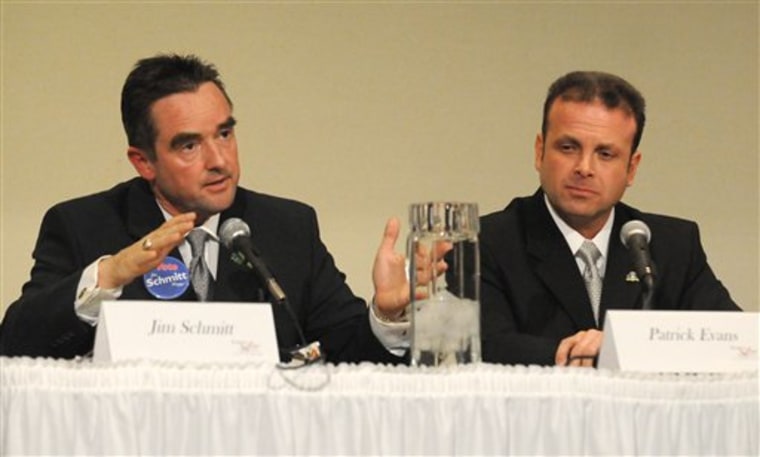When the race for Green Bay mayor began months ago, the main issues looked clear-cut: planning downtown development, dealing with dwindling state aid and debating whether the city should have spent millions to build a replica of Elvis Presley's favorite roller coaster.
But after Republican Gov. Scott Walker's battle with public employee unions erupted, the constant uproar at the Capitol in Madison quickly became the only thing anyone wanted to talk about. Suddenly challenger Patrick Evans' campaign strategy fell apart.
"The people calling me never said, 'Hey, Pat, what do you think about the downtown?' The electorate didn't want to hear that," Evans said.
The passions that filled the Wisconsin Statehouse with round-the-clock, ear-splitting protests have cast a long shadow across the state's political landscape, influencing even small-time races for mayor and village boards — nonpartisan jobs traditionally focused on matters such as parking meters, garbage collection and snow removal.
Evans said his campaign did not expect the abrupt shift in voter interest.
He eventually declared his support for the public employee unions but lost to incumbent Mayor Jim Schmitt, who praised Walker at the start of his campaign and was briefly considered for a position in the governor's cabinet.
"We didn't expect what was going to happen in Madison. We couldn't wrap our arms around it," Evans said. "We couldn't control it. We got swept up in the tidal wave."
Walker's plan sought to ease the state's budget problems by eliminating most collective bargaining rights for public employees and forcing them to contribute more to their health care coverage and pensions. Walker signed the measure into law, but a court challenge has blocked it from taking effect.
Fury of Walker's opponents
In this month's local elections, some candidates tapped into the fury of Walker's opponents. Others who backed the governor, like Schmitt, stood their ground and prevailed.
In Milwaukee County, Republican Jeff Stone won the Feb. 15 primary for county executive, a position Walker held for eight years before becoming governor. On that same day, the first of the mass protests began against Walker's agenda, drawing thousands of people to the Capitol for weeks.
Amid the demonstrations, Stone, who is also a state representative, voted twice for Walker's collective bargaining law. His challenger, Chris Abele, ran ads criticizing Walker's performance in Milwaukee, including one that featured a disgusted-looking man asking, "Jeff Stone? I thought he was Scott Walker's twin."
Abele, a political neophyte, easily beat Stone in the general election.
An almost identical scenario played out in the race for village president in Lake Hallie, a small community in northwest Wisconsin.
Republican state Rep. Kathy Bernier won the primary, then voted twice for Walker's collective bargaining law. She lost the general election by 37 votes.
Bernier said there were no clear signs that backing Walker cost her the race, but she did see one yard sign calling for her recall. And during door-to-door visits, someone asked a friend who accompanied her if he had voted for Walker.
When her friend replied yes, the homeowner slammed the door.
In Outagamie County, just south of Green Bay, former Republican state Treasurer Jack Voight began his run for county executive by playing up his associations with Walker. But after the collective bargaining battle broke out, those ties became a liability. He lost to Democrat Tom Nelson.
"When that issue came forward, I had a dickens of a time," Voight said.
State Supreme Court race
Local elections were not the only ones affected by the union tumult. A sleepy state Supreme Court race exploded into a competitive and closely watched contest after a liberal prosecutor tried to unseat a conservative incumbent. The challenger's supporters worked to frame the vote as a referendum on Walker's proposals.
The debate is unlikely to end anytime soon. Recall attempts are under way against eight Democratic and eight Republican state senators. Those efforts, along with the legal challenge to the law, are sure to stir the controversy for months to come.
Walker's office has consistently rejected any notion that the governor's plans affected other elections. Spokesman Chris Schrimpf insists those races were about different candidates and issues entirely.
In the state's southeast corner, Racine County Supervisor Ken Hall introduced a resolution asking Walker to back off the union changes at the height of Hall's race for county executive post against Jim Ladwig, whose mother served in the Wisconsin Assembly as a Republican alongside Walker. Ladwig ended up winning.
"I know, at times, people may have tried to make it that way, but I don't think (collective bargaining) was a major issue," Ladwig said.
Schmitt, the winner in the Green Bay mayor's race, said his race against Evans was about fiscal responsibility and economic development, not union rights.
"I don't know what Pat's talking about," he said. "People were asking about collective bargaining ... (but) that wasn't the big issue to me."
'I've never seen people so up in arms'
Evans complained early and often about his opponent's decision to build a replica of Elvis's favorite roller coaster, the Zippin Pippin, at a cost of $3.5 million at the city's amusement park.
But, he said, the collective bargaining storm sucked the oxygen out of his run.
"When you have (only) so much news time, so much space, and it's being used to talk about the chaos in Madison versus the chaos in Green Bay, it does take away," Evans said. "I've never seen people so up in arms. I had to get involved with a topic I didn't need to be involved with."
